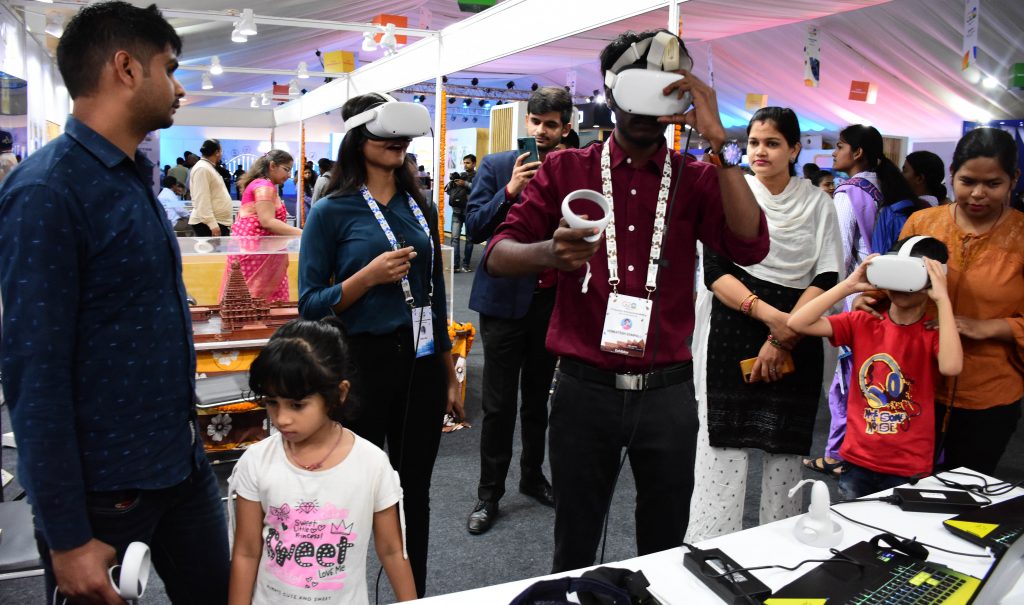Bhubaneshwar: A model preschool education centre, vernacular learning based tech solutions, 3D printed models of various temples with virtual reality experience, drone technicians and cloud gaming are among the technologies and modules on display at the ‘Future of Work’ exhibition ahead of the third G20 Education Working Group meet.
Union Education Minister Dharmendra Pradhan inaugurated the exhibition at the CSIR-Institute of Minerals and Materials Technology (IMMT) here Sunday which will continue till April 28.
More than 100 exhibitors from India and G2O member countries are demonstrating their products at the exhibition spread across 34,000 square feet area.
A unique ‘Future of Work’ experience zone has also been set up at the exhibition where job aspirants can get to know how the future of work will evolve and they will have access to a preview of the required advanced technical skills.
The zone is showcasing the use of cutting-edge technology such as holograms and interactive surface tables and walls, which will enable visitors to get ideas of the future of work and they will be able to visualise how automation and digitisation are transforming the way work is done in several sectors.
“The exhibition showcases the transformations as a result of digital innovations, ways disruptive technologies are re-designing occupations and reshaping the world of work. A unique confluence of technology leaders, innovators, influencers, industry and academia, the exhibition also gives a glimpse of modern worksplaces, skills and jobs of future and the evolving skilling and employability landscape,” Pradhan said at the inauguration.
Social media giant Meta has themed its stall on “building a metaverse” with cases featuring Virtual Reality (VR) and startups showcasing VR across industries on skilling in sectors of nursing, painting, welding, workforce.
The Indian Knowledge System (IKS), an innovative cell at the All India Council for Technical Education (AICTE), has exhibited 3D printed models of various temples along with virtual reality and augmented reality experience.
The Media and Entertainment Skill Council has showcased “cloud gaming” which the officials claimed will transform the gaming landscape in India.
“These technologies offer new and immersive gaming experiences, attracting users and investment, and driving the growth of the media and entertainment industry in India,” an official said.
Hexagon, a prominent name in digital reality solutions, is demonstrating ‘reverse engineering’ which helps to produce a part with better quality and efficiency in five steps — scanning the object, processing data, optimising design with simulation, printing data, measuring and comparing product features with design data for deviations for rework, redesign and rejection.
The Regional Institute of Education (RIE) Bubhaneshwar has displayed model preschool education centre, innovative pre service teacher education activities, art integrated pedagogy, experiential pedagogy, toy-based pedagogy and locally developed learning material for science and mathematics.
AMMACHI Labs, a research center at Amrita Vishwa Vidyapeetham, has displayed how VR can be used to teach scaffolding skills for construction workers besides simulation based learning technologies for drone technician, mechanic, appliance repair technician, haptics simulators for physical skills training and Skill Intelligences Labs.
Several institutes and organisations from diverse sectors, including NIT Rourkela, IIT Bhubaneswar, IIM Sambalpur, Meta, UNICEF and NCERT, participated in the exhibition to display technologies that would drive the future of work, constant innovations in the modern workplace, skills and innovative delivery models.
Future of Work exhibit in three sectors – Agriculture, Mobility and Healthcare, Metaverse, Reverse engineering and automated design solutions, drone technology, Ed-tech solutions leveraging AR and VR, industry 4.0 skills, vernacular learning-based tech solutions, virtual internship solutions, assistive technologies for inclusion, are among other concepts on display at the exhibition.
According to the Ministry of Education officials, over 10,000 visitors thronged the exhibition on the first day.
Foundation literacy and numeracy, tech-enabled learning, future of work and research collaboration are among the priority areas for deliberations during the third G20 Education Working Group meeting scheduled from April 27 to 29.
During the meeting, there would be official-level deliberations on the four identified priority areas — foundational literacy and numeracy, tech-enabled learning, future of work and research collaboration.
The first meeting of the G20 Education Working Group was held in Chennai earlier this year, followed by a second meet in Amritsar last month. There would be three supplementary meetings of the education group before arriving at a consensus in June this year.
PTI
